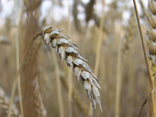Reflections
From the Morrow after the Day of Rest
Throughout the years, many arguments arose between the Pharisees and the Saducees and their followers. One such argument was the beginning date of counting the Omer.
The Sadducees and Boethusians were sects of Jews who were active during the Hellenistic era. Sadduc and Boethus were disciples of Antigonos of Soko and they and their own disciples followed the Hebrew Bible literally and rejected the Pharisees' (Rabbinical Jews) notion of the Oral Torah. Regarding this issue of the sheaf counting, the Sadducees insisted on following the literal understanding of the verse that the waving of the sheaf is done the first Sunday after the commencement of Pesach. According to this teaching the Sheaf waving and offering have no fixed date with the direct outcome being that the Holiday of Shavuos is also not bonded with any specific date and would fall on the fiftieth day after the sheaf waving regardless.
The Pharisees brought many proofs to establish their opinion. They proved that all holidays are referred to as “day of rest” and it did not exclusively mean Shabbos. As we find it stated regarding Rosh-Hashanah “In the seventh month, in the first day of the month, shall be a solemn rest unto you, a memorial proclaimed with the blast of horns” and regarding Succos “On the fifteenth day of this seventh month is the feast of tabernacles for seven days unto the Lord. On the first day shall be a holy convocation; you shall do no manner of servile work”.
Another proof results from a seemingly contradiction between two verses concerning the days on which Matzos are eaten on Pesach. In the book of Vayikra it says “And on the fifteenth day of the same month is the feast of unleavened bread unto the Lord; seven days you shall eat unleavened bread“ but in the book of Devorim chapter 16 it says “Six days you shall eat unleavened bread”. Are we commanded to eat matzo for six days or seven days? The Pharisees answer this contradiction based on their understanding of when the waving of the sheaf is done. The Torah prohibits eating from the new produce of the current year up until the sheaf is waved. We can therefore establish that the verse ordering us to eat matzo for six days is referring to matzo made from the new produce which is always brought the second day of Pesach with six days of the holiday remaining. The verse ordering us to eat matzo for seven days is referring to matzo made from wheat from the past year having no restrictions on the first day of Pesach. However, according to the Sadducees and Boethusians who hold that the sheaf is brought on the first Sunday of Pesach, there is no set calendar day for the waving of the sheaf, and on most years there are less than six days remaining until the end of Pesach, and therefore have no way of settling the seemingly contradiction.
It is brought down in the words of our Rabbis that there was once a Boethusee who came to Rabbi Yochanan ben Zachai interested in confirming his opinion. According to their method of counting which always starts on the first Sunday of Pesach it comes out that the fiftieth day of counting which is day of Shavuos will always fall on Sunday as well. The Boethusee claimed that Hashem’s love and kindness is evident by the fact that the holiday of Shavuos always falls on Sunday. Having Shabbos and Sunday two consecutive days of rest ensures that the Jews get to really enjoy an extended weekend as an act of love and compassion from Hashem. Rabbi Yochanan ben Zachai discounted this confirmation by countering back that if consecutive days of rest were the proof we need of Hashem’s love for his nation, so why if so did he have them wander around the desert for forty years.
The scroll of fasts is a scroll written by the sages marking the days of the year on which fasting and eulogizing are forbidden due to joyous events which occurred on those days. One of those days is the 8th of Nissan. Besides being one of the twelve days on which the heads of the twelve tribes offered their sacrifices in honor of the dedication of the Tabernacle in the desert, it was also the day the Pharisees declared victory over the Sadducees and Boethusians. To add to their celebration they constituted a prohibition to fast or eulogize from the 8th of Nissan until the 14th of Nissan.
After the destruction of the second temple, the two sects the Sadducees and Boethusians vanished from the Jewish scene. However in the middle of the 8th century the Karaite sect was established headed by Anan ben David. The Karaites follow the Sadducees in their rejection of any explanation of the oral law besides the literal one. A minor remnant of this sect still exists and their center is in the city of Ramle. Nowadays as in the past they begin the sheaf counting from the first Sunday of Pesach and not from the second day of Pesach. There is a fragment of the Ethiopian community who also follow this custom.







